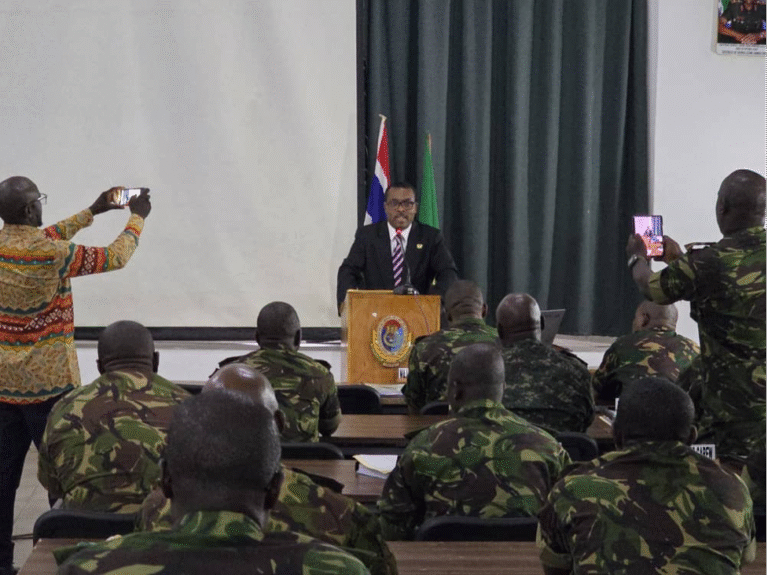By Saidu Dumbuya
The UN Population Fund (UNFPA) has in a press conference unveiled two strategic documents to members of the Forth Estate and these include the 8th Country Programme Document (CPD) for the period 2025-2030, and the 2024 Annual Report marking the conclusion of the 7th CPD cycle.
The press conference was held on Friday 18th July 2025 at UNFPA’S Country Plot 56 Main Motor Road office, Wilberforce in Freetown.
Addressing newsmen, UNFPA’s OIC, Ms. Sibeso Mululuma, the Background and Context said the 8th Country Programme (2025-2030) is a product of close collaboration between UNFPA, the Government of Sierra Leone, civil society, and development partners. It builds on lessons learned from the 7th Country Programme (2020-2024), which concluded in December 2024, and aligns strongly with national development priorities as articulated in the Medium-Term National Development Plan (MTNDP) 2024-2030.
She said UNFPA’s strategic focus in Sierra Leone is guided by its global vision of achieving three transformative results which is ending the unmet need for family planning, ending preventable maternal deaths, ending gender-based violence and harmful practices.

She noted that the CPD is also aligned with the United Nations Sustainable Development Cooperation Framework (UNSDCF), and it aims to contribute directly to the realization of the Sustainable Development Goals (SDGs), especially those related to health, gender equality, youth empowerment, and data for development.
Giving an Overview of the 8th Country Programme Document (2025-2030), she maintained that the new CPD envisions a Sierra Leone where every pregnancy is wanted, every childbirth is safe, and every young person can realize their full potential. The document outlines strategic priorities that reflect national needs and the realities of communities, these include:
Strengthening access to quality sexual and reproductive health services, including comprehensive maternal health care and youth-friendly services; Promoting gender equality and eliminating gender-based violence and harmful practices through multisectoral responses and community-based interventions,
Scaling up access to modern contraceptives and strengthening supply chain systems to ensure the availability of life-saving commodities;
Supporting population and development programme by strengthening data systems, including civil registration and vital statistics (CRVS), and the use of disaggregated data for planning and monitoring;
Empowering adolescents and youth, especially girls, to access SRHR information and services, education, and livelihood opportunities;
Promoting supportive laws, policies, and financing frameworks that advance SRHR, women’s rights, and youth leadership.
The CPD reflects a shift towards more integrated, resilient, and accountable systems, while emphasizing equity, innovation, and local ownership. Its development involved extensive consultation with stakeholders including government ministries, civil society, youth networks, women’s groups, persons with disabilities, and traditional leaders.
Key Highlights from the 2024 Annual Report
The 2024 Annual Report captures the achievements of UNFPA’s 7th Country Programme during its final year of implementation. Highlights include:
Strengthening the maternal health workforce with the training of over 480 midwifery students, including the graduation of 283 qualified midwives;
Providing surgical repairs and reintegration support to over 200 women living with obstetric fistula, with more than 700 screened and 135 receiving vocational training;
Improving maternal and newborn outcomes through emergency obstetric and newborn care (ErnONC) capacity-building for over 300 healthcare workers and conducting EmONC assessments in 34 health facilities;
Supporting digital innovation through the roll-out of the Pregnancy Registration and Service Tracking (PreSTrack) app, which registered over 11,000 pregnancies and facilitated life-saving referrals; supplying contraceptives that covered 90% of public sector requirements across all districts, helping prevent an estimated 230,000 unintended pregnancies and maternal deaths.
Enhancing family planning uptake through mass media campaigns, community engagement, and advocacy, leading to a 15% increase in demand satisfaction for modern contraception between 2012 and 2024; Supporting over 44 communities to adopt bylaws against child marriage and other harmful practices, Providing GBV survivor support through seven One Stop Centres, which reached 552 survivors with integrated services including health care, legal aid, and psychosocial counseling; Supporting the reintegration of over 4,300 girls, including pregnant girls and girls with disabilities, into formal education as part of efforts to implement the Radical Inclusion Policy, Engaging male champions and peer educators to promote positive masculinities and community advocacy against GBV; Supporting the enactment of the Prohibition of Child Marriage Act and the operationalization of the GEWE Act through stakeholder consultations and national planning frameworks; Establishing youth leadership and innovation platforms such as the Young Women Leading Change Challenge, which empowered 40 young female innovators, including those with disabilities;
Advancing menstrual health and period dignity through symposiums, training on reusable pad production, and school-based outreach; supporting anti-drug efforts by providing rehabilitation support, dignity kits, and educational reintegration for youth affected by substance abuse.
Other speaker who made rerecorded contributions during the presser, include, Minister of Gender and Children’s Affairs, Dr Isata Mahoi, and also the keynote speaker, Minister of Planning and Economic Development, Kenyah Barley among others.







